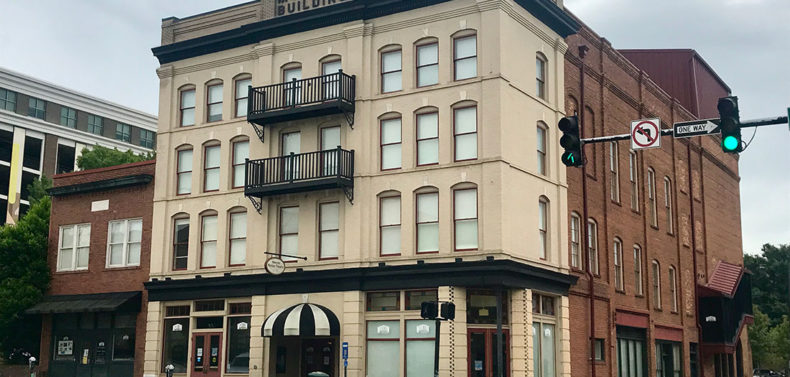This year marks the Morton Theatre’s 110th anniversary as a local institution. The building has provided a space on the Hot Corner of Hull and Washington streets for endeavors including medical offices and a pharmacy, civic engagement and entertainment. Yet, with COVID-19 and more recently the Black Lives Matter movement consuming public attention, the Morton’s milestone has been overshadowed. With six months of 2020 gone and the next six to go, there is still ample time for Athens to champion the Morton’s long-time presence and impact within the community.
To recap, the Morton Theatre was built, owned and operated by Monroe Bowers Morton in 1910, was submitted to the National Register of Historic Places in 1979, and is currently known as one of the last surviving Black vaudeville theaters in the U.S. In its prime, the building held a bounty of purpose, hosting acts such as Blind Willie McTell, Ma Rainey, Cab Calloway and Bessie Smith, while also housing Black professionals like doctors, dentists, barbers and beauticians. It even doubled as a movie house at the height of the “silver screen” in the early 20th Century.
By the 1950s, the Morton had been abandoned. It was later saved in 1987 by the local community through volunteer labor, fundraisers, grants and SPLOST funding. The building was then handed over to the Athens-Clarke County government on Nov. 1, 1991. Within two years, the theater and offices were renovated and reopened to the public as the performing arts space we know and love.
Today, the Morton Theatre is staffed by ACC Leisure Services, with programming developed by the Morton Theatre Corporation, a non-profit organization designed to help support and manage the Morton’s cultural affairs and community presence.
As for the Morton’s anniversary, the building officially opened on May 18, 1910, when a piano concert by Alice Carter Simmons, of the Oberlin Conservatory of Music, was held to celebrate the occasion. One hundred years later, on May 18, 2010, a centennial celebration was held, when Rosalyn Floyd, of Augusta University, played many pieces from Simmons’ original performance. Other notable acts that visited for the Morton’s 100-year celebration included Beverly “Guitar” Watkins, Avery Sunshine and Titus Burgess.
Back in January of this year, the Morehouse College Glee Club performed as a part of this year’s 110th celebration, which was to include a week of festivities in May. However, due to venue closures and several event cancellations amid the pandemic, the Morton and ACC Leisure Services opted for releasing an informational video that recounts facts about the building’s architecture, prominent acts that have played there and much more.
The Morton’s staff is eager to welcome the public and continue providing entertainment and rental space to the community, but first they must continue developing a plan to safely reopen their doors. For now, staff has been observing CDC guidelines pertaining to live performance venues and recent orders from Gov. Brian Kemp and collaborating with fellow ACC departments, including Leisure Services, to create plans unique to their areas of service. The Morton’s newsletter has also distributed a survey asking for input on the type of programming and safety protocols patrons would like to see put in place upon the reopening.
In terms of what the future looks like for the Morton, Facility Supervisor and Managing Director Lynn Battle Green notes that work is still being done to keep things running smoothly.
“[O]ur staff has been working remotely, dealing with the aftermath of event cancellations, juggling scheduled rental events on our calendar, participating in virtual meetings with colleagues across the country…and just staying flexible to take on whatever the next normal looks like,” Green said.
Green also emphasized the Morton’s presence within ACC’s Arts Division unit alongside institutions like the Lyndon House Arts Center, the East Athens Educational Dance Center and Athens Creative Theatre. She also stressed the effort being made to sustain the impact the Morton has on local residents and on tourists.
“We want to stay engaged with the community and be able not only to provide entertainment and enrichment, but to also be a place where we can have the difficult conversations and use the arts and culture as a means of expression to bring people together. We have a rich history that deserves and demands to be preserved and shared. We are working on efforts to achieve and showcase that in a way to keep the stories alive for future generations, not just for Athenians, but in ways that visitors to the building—whether for tours or to attend special events—will know more about the rich African American history of the building. We want to strengthen the connection people feel with the building, as well as foster an understanding of the amazing people and stories that the history taught hasn’t always celebrated,” Green said.
The public is invited to continue celebrating the Morton’s legacy by sharing their love for the historic location in a variety of formats, such as videos, letters, audio files, photos or even social media posts, using #MortonMemories. All of these submissions will be released on a weekly basis and shared across the Morton’s social media platforms. For more information on how to get in on this milestone celebration, visit the Morton Theatre’s 110th-anniversary webpage and be on the lookout for further updates—which just might include a memory of your own.
Like what you just read? Support Flagpole by making a donation today. Every dollar you give helps fund our ongoing mission to provide Athens with quality, independent journalism.









